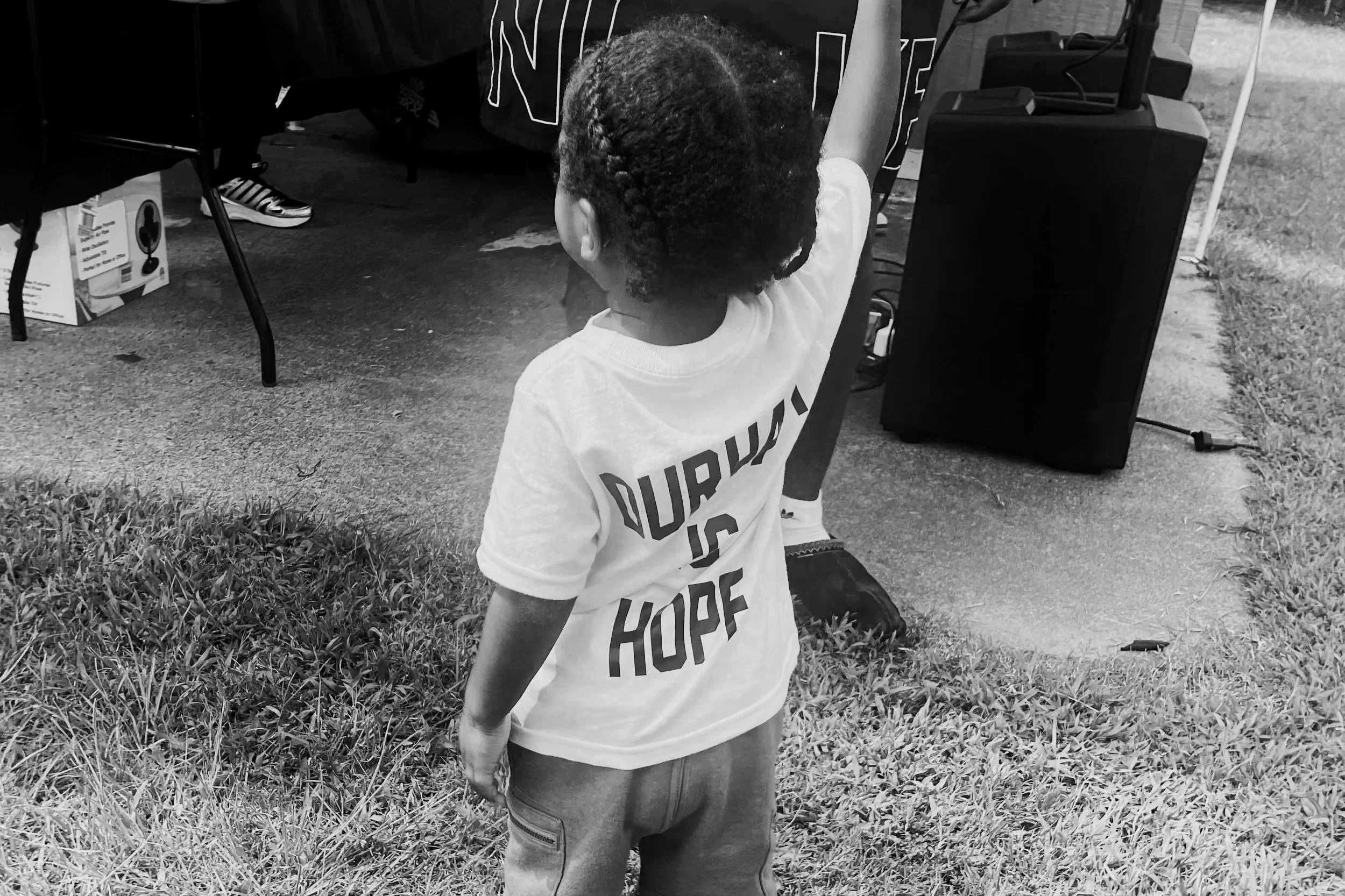
Environment & Education
Strong Minds. Green Spaces. A Durham That Grows with Care.
“A Safe Space to Grow, Play & Learn—4 Everyone—Who Chooses Durham.”
In Durham, the environment and education have too often been treated as extras—when they are, in fact, essential. Our parks, sidewalks, trails, and libraries should reflect our respect for every neighborhood. Our schools and learning spaces should be sacred ground—not afterthoughts.
As mayor, Anjanée Bell will fight for a city where public spaces are safe, clean, and connected—and where learning does not stop at the classroom door. That means investing in afterschool programs, honoring the wisdom of our elders and artists, and building green spaces that heal and connect us.
Every child, every family, every neighbor deserves to grow in a Durham designed with care.
Explore More Below
-
Durham has not treated education and environment as essential infrastructure—and too many families feel the impact every day.
Basic infrastructure like safe sidewalks, lighting, and transit access is missing in many areas—making daily commutes unsafe and unwelcoming.
Some parks remain unsafe or contaminated—undermining public trust and limiting access to joy, healing, and movement.
Amenities have been removed from certain areas—sending a harmful message about who is welcome.
Artists, educators, and youth mentors are under-supported—while too few public spaces are designed for non-school learning and lifelong growth.
Too often, our city treats education like a school-day issue and the environment like a side project. These are not side issues. They are the soul of a just and joyful city.
-
What kind of future are we building if our environment does not support growth at every age and stage of life?
Durham deserves a city where every child grows up in spaces that are safe, affirm their dignity, and spark curiosity—spaces made with them in mind, not as an afterthought, but as the foundation. Our vision must hold every generation—from the stroller to the wheelchair—and honor the brilliance, movement, and care each person carries.
A Durham where children walk through tree-lined streets to school, where elders rest in shaded parks, and where every resident feels proud of the place they live.
A network of trails, parks, and libraries that connect our communities, restore our health, and make movement, joy, and knowledge available to all.
A Durham that understands education is lifelong—and that what surrounds us teaches just as much as what is on the page.
A climate-ready Durham that honors nature, builds with resilience, and restores what has been neglected.
In a better Durham, we do not design around people—we design with them, beginning with those who are most often ignored. When Durham works for our most vulnerable, it works better for us all.
-
As Mayor, I will work with my colleagues and our community to:
Ensure Durham’s parks, trails, and green spaces are safe, clean, accessible, and fully connected—by expanding green spaces, prioritizing long-overdue investments, remediating hazards, reimagining removed or neglected amenities with the community, and designing these spaces to support learning, wellness, and care.
Strengthen Durham’s learning environment—by improving school zones with sidewalks, lighting, and transit access; investing in afterschool programs, neighborhood libraries, and intergenerational learning environments led by artists, elders, educators, and organizers; and designing infrastructure that treats schools as sacred civic ground—embedded in city planning, not apart from it.
Work with frontline workers, schools, and neighborhoods to keep Durham clean—by improving city collection standards, holding private waste collectors accountable, addressing sanitation around encampments and construction sites, and building a shared civic ethic to leave every space better than we found it.
Hold developers accountable to honor the land and the people—by preserving green space, repairing post-construction damage, and contributing meaningfully to shared public goods in every project: sidewalks, stormwater systems, trees, trails, and open space. Every project should reflect long-term community value—not short-term profit.
Two years may not reverse every injustice—but it is enough to prove what happens when you build with people, not over them.
-
As Mayor, I will work with my colleagues and our community to:
Ensure Durham’s parks, trails, and green spaces are safe, clean, accessible, and fully connected—by expanding green spaces, prioritizing long-overdue investments, remediating hazards, reimagining removed or neglected amenities with the community, and designing these spaces to support learning, wellness, and care.
Strengthen Durham’s learning environment—by improving school zones with sidewalks, lighting, and transit access; investing in afterschool programs, neighborhood libraries, and intergenerational learning environments led by artists, elders, educators, and organizers; and designing infrastructure that treats schools as sacred civic ground—embedded in city planning, not apart from it.
Work with frontline workers, schools, and neighborhoods to keep Durham clean—by improving city collection standards, holding private waste collectors accountable, addressing sanitation around encampments and construction sites, and building a shared civic ethic to leave every space better than we found it.
Hold developers accountable to honor the land and the people—by preserving green space, repairing post-construction damage, and contributing meaningfully to shared public goods in every project: sidewalks, stormwater systems, trees, trails, and open space. Every project should reflect long-term community value—not short-term profit.
Two years may not reverse every injustice—but it is enough to prove what happens when you build with people, not over them.
-
No neighborhood should be treated as disposable.
Parks, trees, and clean sidewalks are not luxuries. They are signs of respect—and every ZIP code deserves them.
Education should not depend on what side of town you live on. Learning should be visible, walkable, and woven into the places we gather.
When public land is ignored or sold off without care, we lose more than space. We lose memory, safety, and possibility.
Our elders, our artists, our youth—they all carry knowledge. For too long, we have built as if that wisdom does not matter.
In a better Durham, the environment is education—and every neighborhood is designed to grow into a community, where people can grow, learn, connect, and thrive—right where they are.
